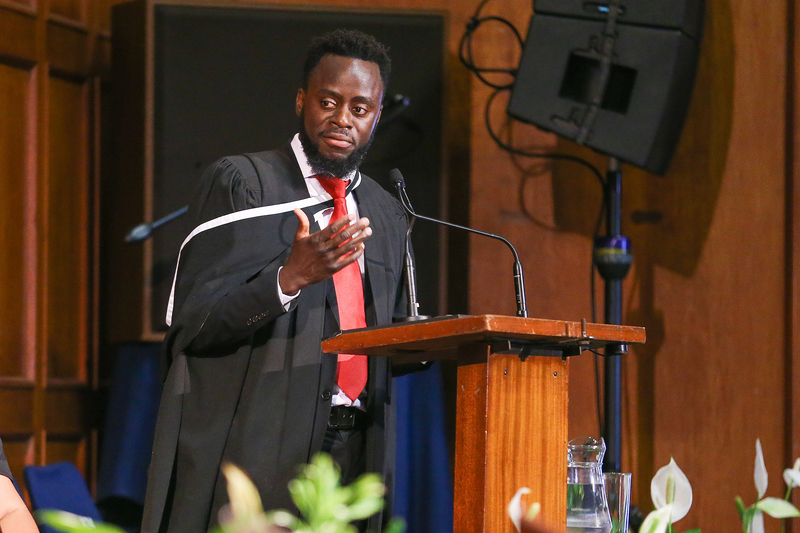‘Make a commitment to your career’
17 December 2019 | Story Nadia Krige. Photo Roger Sedres. Read time 6 min.
While success may look different to everyone, there is one thing we all need to achieve it: commitment. This was guest speaker Sandras Phiri’s message to graduands during the University of Cape Town’s (UCT) Faculty of Health Sciences’ second ceremony on Friday, 13 December. A 2012 MBA graduate, Phiri is a serial entrepreneur and the co-founder and CEO of Africa Trust Academy.
Drawing on his vast experience as an entrepreneur and startup coach focusing on small businesses in Southern Africa, Phiri congratulated graduands on their hard work and commitment to their studies. He also encouraged them to take this positive mentality out into the wide world as they embark on new journeys.
Paint what you want
“One of the questions I get asked a lot is ‘what will make me succeed?’. Of course, there is no one answer to that question. And success, if anything, depends on a lot of factors,” he said.
“So, when you ask me that question, I answer you with one of my own. I say: ‘What do you want?’. And a lot of times, people start to talk about what they don’t want.”
While this recognition is helpful, Phiri said, it is more important to know what you do want, so you can pursue that passionately.
“Don’t spend your energy and time adding colour and detail to the painting you don’t want,” he advised graduands.
“Spend energy and time adding colour and detail to the painting you want.”
He also urged graduands to decide whether they were casual about or committed to this vision.
A personal anecdote
“I think nothing illustrates the difference between casual and commitment than the work people in health sciences do,” Phiri said.
He went on to share an anecdote from his own family to illustrate this point.
Phiri is the father of two teenage sons, one of whom was born with a genetic condition called sickle cell anaemia. While one can live a completely normal and healthy life with the disease, there are times it can be life threatening. These normally occur when red blood cells are under stress. Instead of the normal disc shape, they take on a sickle shape and get stuck in blood vessels, causing an oxygen shortage.
Two years ago, his son went into a sickle cell crisis after a minor operation and, with his blood oxygen level at 58%, his haemoglobin (HB) count at 5 gm/dL (men should have a HB count of 14 to 17 gm/dL), one lung working at about 50% capacity and the other at about 10%, was rushed to the intensive care unit (ICU).
Reflecting on the 11 days they spent in ICU with their son – who was restored to full health – Phiri said: “Looking at everybody working, it was clear to see that they were not casual about the outcome they were trying to achieve. They were committed. They cared.”
During the ordeal, however, Phiri said there was a single moment that illustrated this commitment more clearly than any other.
On the second day more of Phiri’s son’s blood had to be drawn to perform important tests, but the nurses were battling to find a vein. Working together, the ICU nurses, the paediatric nurse, the ER nurse and the lab nurse all focused on solving this problem. After a long time, the lab nurse successfully inserted the needle into a vein, and the entire ward cheered.
“Watching that, I realised that there are a lot of us who are too casual about our work. Too casual about our businesses, our endeavours,” Phiri said.
“Imagine if you’re trying to find a vein for a medical treatment and after 10 minutes you say: ‘Ah you know what? Why don’t we try this tomorrow?’, instead of ‘We’ll keep trying until we find a solution’.”
The power of commitment
With this poignant image, Phiri illustrated the transformative power commitment to your work can have on achieving success.
“But commitment requires courage. It requires the courage to say ‘I’ll do it’; the courage to take action; the courage to say ‘I need help’; the courage to say ‘we work well together because you are good in this area where I am not’; the courage to say ‘thank you’; the courage to say ‘well done!’; the courage to be the first one to say: ‘I love you’.”
Phiri also reminded graduands that commitment would not shelter them from disappointments, pain, loss and failure.
“But you will also get up, you will heal, you will win.
“In closing, I encourage you to make a commitment to your decision. Make a commitment to your chosen field. Your chosen business. Make a commitment to your career. Make a commitment to others. Most importantly, make a commitment to yourself.”
 This work is licensed under a Creative Commons Attribution-NoDerivatives 4.0 International License.
This work is licensed under a Creative Commons Attribution-NoDerivatives 4.0 International License.
Please view the republishing articles page for more information.
December graduation 2019
The University of Cape Town will be celebrating the graduation of 1 960 of its students over six graduation ceremonies on 12, 13 and 23 December, which include the conferral of three honorary doctorates and the presentation of the UCT Book Award and the UCT Creative Works Award. This graduation season, we also bid a fond farewell to our chancellor, Mrs Graça Machel, who has been the titular head of the university for the past 20 years. Her compassionate and dedicated service to the university will be deeply missed.












































